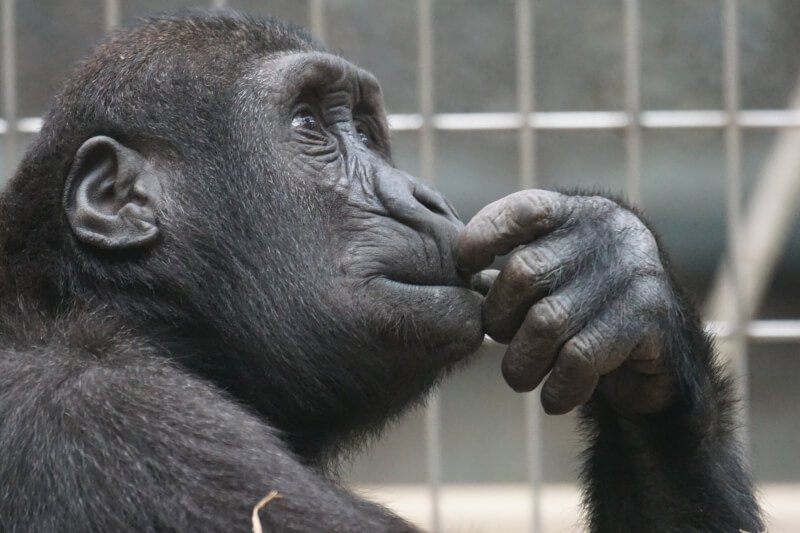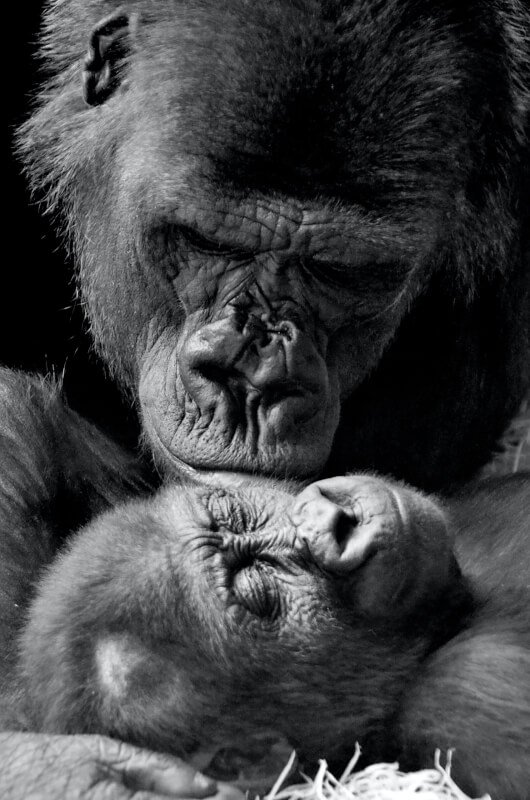In today’s article, we explore a fascinating topic that delves into the depths of primate psychology – the impact of social support on their emotional well-being. Primates, just like humans, thrive on connections and relationships, and understanding how social support influences their emotional state is crucial in our quest to comprehend their intricate social dynamics. Join us as we delve into this intriguing subject and unlock the secrets behind the emotional well-being of our primate counterparts.
The Importance of Social Support in Primates
Types of Social Support in Primate Communities
Social support plays a crucial role in the lives of primates, as these highly social animals rely on strong connections and relationships within their communities for emotional well-being. There are various types of social support observed among primates, each serving a unique purpose. One type of support is physical comfort, where individuals engage in grooming behaviors to establish and strengthen social bonds. Grooming not only provides hygienic benefits but also promotes trust and cooperation among group members. Another type of support is emotional support, which can be seen through comforting behaviors such as hugging or embracing during times of distress. This type of support helps individuals feel secure and loved within their primate communities.
The Role of Social Support in Emotional Well-being
Social support is vital for the emotional well-being of primates. By providing a sense of belonging and security, social support helps individuals cope with stressors and maintain a positive mental state. The presence of supportive social relationships has been shown to reduce anxiety and depression among primates. Furthermore, social support helps in regulating emotions by providing a support network to share experiences, exchange information, and seek assistance when needed. These social connections contribute to increased resilience and an overall higher quality of life for primates.
The Effects of Social Isolation on Primates
Psychological Consequences of Social Isolation
Social isolation has significant psychological consequences for primates. Primates are highly social creatures and thrive in the presence of others. When isolated from their social groups, they experience loneliness, boredom, and heightened stress. The lack of social interactions can lead to the development of behavioral issues such as self-harm, aggression, and self-imposed social withdrawal. Moreover, social isolation can negatively impact cognitive abilities, as primates rely on social learning and imitation for the acquisition of important skills. Overall, prolonged social isolation can greatly affect the emotional well-being of primates, leading to long-term psychological damage.
Physiological Effects of Social Isolation
In addition to psychological consequences, social isolation also has significant physiological effects on primates. Research has shown that isolated primates experience higher levels of stress hormones, such as cortisol, which can have detrimental effects on their immune system and overall health. Furthermore, social isolation can disrupt the normal functioning of the neuroendocrine system, affecting the regulation of emotions and behaviors. The lack of social support can lead to increased susceptibility to diseases, impaired reproductive functions, and a reduced lifespan. It is evident that social isolation poses serious risks to the physical well-being of primates.

Social Bonds and Emotional Well-being
The Formation of Social Bonds in Primates
Social bonds are crucial for the emotional well-being of primates. These bonds are formed through various behaviors such as grooming, playing, and sharing resources. The formation of social bonds is a complex process influenced by factors such as kinship, reciprocity, and proximity. Kinship bonds, formed between closely related individuals, often result in long-lasting and strong social connections. Reciprocal interactions, where individuals engage in mutually beneficial behaviors, also contribute to the formation of social bonds. Additionally, proximity and shared social networks play a role in establishing and maintaining social relationships among primates. These bonds provide emotional support, a sense of belonging, and contribute to overall well-being.
The Role of Social Bonds in Reducing Stress
Social bonds play a crucial role in reducing stress among primates. When faced with challenging situations or threats, individuals with strong social bonds are more likely to receive support and reassurance from their companions. This support acts as a buffer against stress, helping individuals manage and cope with difficult circumstances. Social bonding and affiliative behaviors have been observed to reduce levels of stress hormones, promoting emotional stability and resilience. The presence of social bonds creates a supportive environment where individuals can find comfort, safety, and emotional solace, ultimately leading to improved emotional well-being.
Social Support and Mental Health in Primates
The Impact of Social Support on Anxiety
Social support has a significant impact on anxiety levels in primates. Studies have shown that individuals with strong social connections experience lower levels of anxiety compared to those who lack a supportive social network. The presence of companionship and the ability to seek emotional support during stressful situations can alleviate anxiety symptoms. Furthermore, social interactions and affiliative behaviors provide opportunities for distraction and positive emotional experiences, helping individuals manage their anxiety more effectively. Social support can act as a protective factor against the development and worsening of anxiety disorders, contributing to better mental health in primates.
Social Support and Depression in Primates
Depression is another mental health issue that can be influenced by social support in primates. Social connections and support networks are vital for preventing and mitigating the symptoms of depression. Individuals with strong social bonds have a greater likelihood of receiving emotional support, comfort, and companionship, reducing feelings of loneliness and hopelessness. Engaging in positive social interactions and activities can also increase the production of endorphins and other “feel-good” hormones, which can alleviate depressive symptoms. In contrast, social isolation or the loss of social bonds can lead to an increased risk of depressive behaviors and worsening of depressive symptoms. Thus, the presence of social support is crucial in promoting emotional well-being and preventing depression in primates.

Parental Care and Support
The Influence of Parental Care on Emotional Development
Parental care plays a crucial role in the emotional development of primates. Primates, like humans, rely on the care and support of their parents or caregivers during their early stages of life. Parental care provides emotional security, nurturance, and guidance, which are essential for the healthy emotional development of primates. The presence of attentive parents allows offspring to form secure attachments, which serve as a foundation for future social relationships. Parental care also helps in the regulation of emotions, as parents provide a safe environment for offspring to express and process their feelings. Overall, parental care significantly contributes to the emotional well-being of young primates.
The Role of Parental Support in Coping with Stress
Parental support is crucial for helping primates cope with stress. When faced with challenging situations, young primates rely on their parents for comfort, protection, and guidance. Parental support has been observed to reduce the stress response in offspring, as the presence of a supportive caregiver can provide a sense of safety and reassurance. Parents also play a vital role in teaching coping mechanisms and problem-solving skills, equipping their young with the necessary tools to navigate stressful experiences. The availability of parental support promotes emotional resilience and helps young primates develop effective stress management strategies.
Friendship and Companionship
The Significance of Friendships in Primate Communities
Friendships hold great significance in primate communities. These close relationships provide companionship, emotional support, and social validation. Friendships are often based on mutual trust, reciprocity, and shared experiences. Primates engage in various behaviors to strengthen their friendships, such as grooming, playing, and engaging in affiliative displays. Similarly to human friendships, primate friendships have been observed to enhance emotional well-being and reduce stress. The presence of a trusted friend can offer support during times of distress, increase feelings of happiness and connectedness, and improve overall social and emotional functioning.
The Role of Companionship in Emotional Well-being
Companionship plays a vital role in the emotional well-being of primates. The presence of a companion or a supportive social group fosters a sense of belonging and reduces feelings of loneliness. Companionship provides opportunities for emotional expression, social interaction, and intimacy, which are essential for maintaining good mental health in primates. Being in the company of trusted individuals also promotes a positive mood, increases self-confidence, and reduces stress levels. Additionally, companionship provides a platform for learning and practicing social skills, contributing to improved emotional well-being. Whether it is a close friend or a larger social group, companionship plays a central role in promoting emotional stability and overall happiness in primates.

Altruism and Cooperation
Altruistic Behaviors and Emotional Benefits
Altruism, the selfless concern for the well-being of others, is observed among primates and has emotional benefits. Engaging in altruistic behaviors, such as sharing resources or providing assistance, promotes positive social relationships and strengthens social bonds. Altruism fosters feelings of empathy, compassion, and reciprocity, which contribute to emotional well-being. Primates exhibiting altruistic behaviors often experience a sense of satisfaction and joy, which promotes positive emotions and increases overall life satisfaction. By engaging in acts of kindness and cooperation, primates establish a supportive and harmonious social environment that enhances emotional well-being.
The Positive Impact of Cooperation
Cooperation among primates has a positive impact on their emotional well-being. Cooperation involves individuals working together to achieve a shared goal, often requiring trust, communication, and collaboration. Cooperative behaviors promote social cohesion, reduce conflict, and strengthen social bonds within primate communities. These positive social interactions contribute to feelings of satisfaction, fulfillment, and a sense of purpose. Cooperation also provides opportunities for learning, problem-solving, and sharing knowledge, which can enhance both individual and collective emotional well-being. The presence of cooperative behaviors fosters a supportive and harmonious social atmosphere, enhancing the overall emotional health of primates.
Social Integration and Emotional Resilience
The Benefits of Social Integration for Emotional Resilience
Social integration is important for the emotional resilience of primates. Socially integrated individuals have strong and diverse social networks, allowing for increased social support, companionship, and belongingness. The presence of multiple social connections provides a buffer against stress, as individuals have a wider range of support to rely on during challenging times. Social integration also enables individuals to access a variety of resources, opportunities for social learning, and the exchange of information. This enhances emotional resilience and increases the ability to adapt and cope with adversity. Overall, social integration fosters emotional well-being and helps primates navigate through life’s ups and downs.
Strategies to Foster Social Integration
There are various strategies to foster social integration among primates. Encouraging communal activities and social interactions can create opportunities for individuals to form bonds and establish connections. Providing enriching environments that promote exploration, communication, and play can encourage social integration and increase the likelihood of positive social encounters. Creating spaces that facilitate the sharing of resources and the formation of social hierarchies can also contribute to social integration. Additionally, ensuring the availability of safe and supportive social environments, free from threats and aggression, is essential for fostering social integration and emotional well-being in primates.

The Role of Dominance Hierarchy in Social Support
The Influence of Dominance Hierarchy on Social Support Networks
Primate communities often have a dominance hierarchy, where certain individuals hold higher social ranks and exert control over others. The dominance hierarchy can influence social support networks among primates. Higher-ranking individuals often have greater access to resources and social connections, allowing them to provide more support to others. Conversely, lower-ranking individuals may have limited access to support and may rely on relationships with higher-ranking individuals for social support. The dominance hierarchy shapes the availability and distribution of social support within primate communities, which can impact emotional well-being. It is crucial to promote balanced and inclusive social support networks, ensuring that all individuals have access to the necessary support for emotional health and well-being.
Implications for Emotional Well-being
The dominance hierarchy can have implications for the emotional well-being of primates. Individuals in higher social ranks may experience reduced stress due to their access to resources and social support. However, lower-ranking individuals may face increased stress and limited access to support, which can negatively impact their emotional well-being. Imbalances in social support within the dominance hierarchy can lead to social exclusion, social isolation, and heightened stress levels for certain individuals. Promoting social equity and reducing social disparities within primate communities is vital for ensuring the emotional well-being of all individuals, regardless of their social rank.
Social Learning and Emotional Well-being
The Role of Social Learning in Emotional Development
Social learning plays a crucial role in the emotional development of primates. Primates, like humans, acquire important behavioral and emotional skills through observation, imitation, and learning from others. Social interactions serve as a platform for learning emotional regulation, conflict resolution, and social norms. By observing and imitating the behaviors of their companions, individuals learn how to navigate social dynamics, express emotions effectively, and build strong relationships. Social learning provides primates with the necessary tools to adapt to social challenges, which in turn promotes emotional well-being and overall social competence.
The Importance of Social Learning for Coping Skills
Social learning also contributes to the development of coping skills in primates. Through social interactions, individuals learn from each other’s experiences and acquire effective strategies for coping with stressors. Observing how others handle challenging situations and seeking support from companions helps primates develop adaptive coping mechanisms. Social learning provides a repertoire of coping behaviors, such as seeking social support, engaging in affiliative interactions, or engaging in physical activities, that can reduce stress and enhance emotional well-being. By learning from others, primates gain valuable insight and skills that help them effectively cope with life’s stressors.
In conclusion, social support is of utmost importance for the emotional well-being of primates. Whether through social bonds, parental care, friendships, or cooperation, the presence of strong social connections provides emotional security, resilience, and a sense of belonging. Social support reduces stress, mitigates the risk of mental health issues, and contributes to overall happiness in primate communities. Recognizing the significance of social support and implementing strategies to enhance social integration and support networks can greatly improve the emotional well-being and quality of life for primates.



